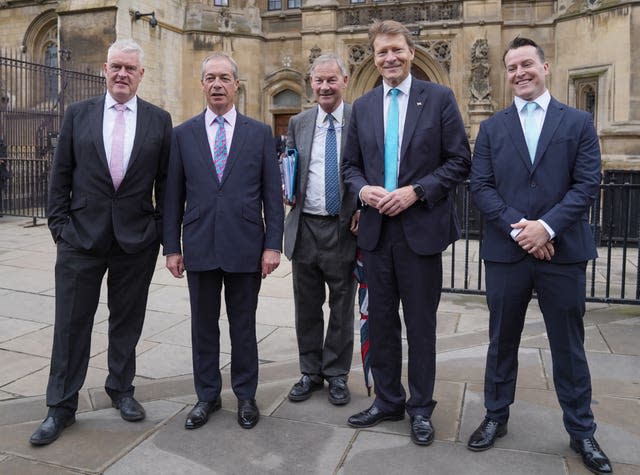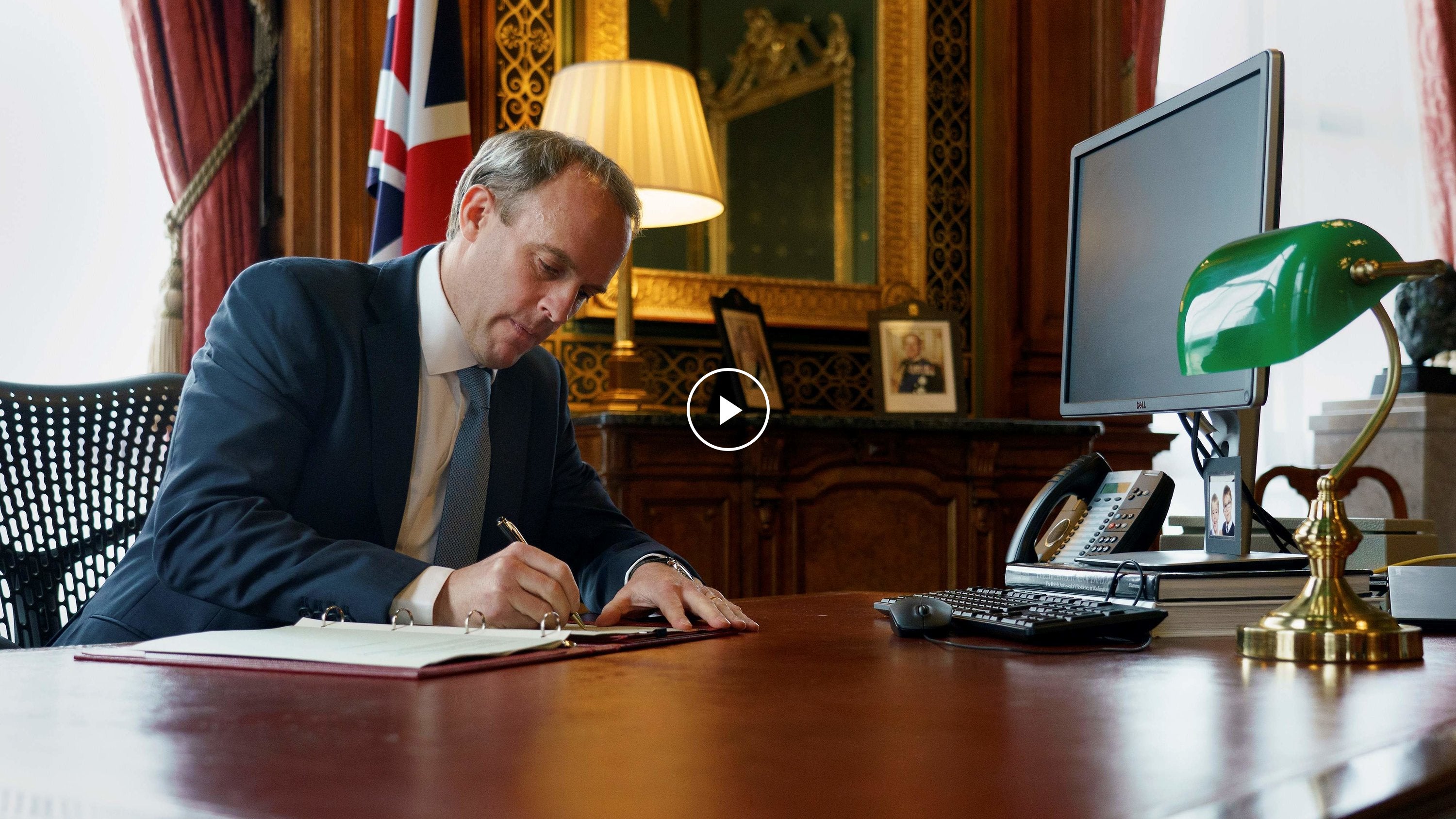Five Threats To Reform UK's Political Future

Table of Contents
Erosion of Public Trust in Institutions
The foundation of any effective political system rests on public trust. However, recent events have significantly eroded this trust in the UK, creating a major obstacle to meaningful reform.
Impact of recent scandals and controversies
Recent scandals, such as "Partygate," have severely damaged public confidence in political integrity. These events, perceived as breaches of ethical standards and disregard for the rules, have fueled a sense of disillusionment and cynicism.
- Decreased voter turnout: Engagement in the democratic process has declined, reflecting a growing disconnect between the public and their elected representatives.
- Rise in political apathy: Many citizens feel their voices are unheard, leading to a sense of powerlessness and disengagement from the political process. This apathy makes implementing reforms far more difficult.
- Increased distrust in established parties: The scandals have damaged the reputation of established political parties, fostering a climate of distrust and hindering the effectiveness of reform initiatives.
This lack of trust hinders reform efforts by creating a climate of resistance to change. Rebuilding public confidence requires demonstrable commitment to transparency and accountability. This includes strengthening ethics regulations, implementing stricter enforcement mechanisms, and fostering a culture of openness and honesty within political institutions.
The spread of misinformation and disinformation
The proliferation of misinformation and disinformation, particularly via social media, further undermines public trust and hinders rational debate about political reform. Biased news sources and manipulative online campaigns often cloud public perception, making it difficult to engage in productive discussions about vital changes.
- Difficulty in discerning fact from fiction: The sheer volume of misleading information makes it challenging for citizens to identify credible sources and make informed decisions.
- Polarization of public opinion: Misinformation contributes to the polarization of public opinion, making consensus-building on reforms increasingly difficult.
- Manipulation of electoral processes: The spread of false narratives can influence electoral outcomes, potentially undermining the legitimacy of the democratic process itself.
Combating misinformation requires a multi-pronged approach. This includes promoting media literacy initiatives to equip citizens with the skills to critically evaluate information, supporting independent fact-checking organizations, and holding social media platforms accountable for the content they host.
Party Political Gridlock and Polarization
The current political landscape in the UK is characterized by significant gridlock and polarization, making it challenging to achieve consensus on necessary reforms.
The two-party system's limitations
The dominance of two major parties often restricts the political spectrum, limiting the potential for innovative reforms. This system can stifle diverse viewpoints and fail to adequately represent the interests of minority groups.
- Lack of diverse viewpoints: The two-party system may not adequately reflect the broad range of opinions and perspectives within the population.
- Limited representation of minority interests: Marginalized communities may feel their concerns are overlooked in a system dominated by two major parties.
- Difficulty in achieving consensus on crucial reforms: The deeply entrenched ideological positions of the two main parties can make compromise and consensus-building extremely challenging.
This gridlock leads to stagnation in policy-making and fuels public dissatisfaction. Exploring electoral reform options, such as proportional representation, and actively promoting cross-party collaboration are vital steps to address these limitations.
Increased political tribalism
The growing ideological divide and increased political tribalism make compromise and consensus-building increasingly challenging. Echo chambers on social media reinforce existing biases, making it difficult to find common ground.
- Rise of extremist groups: Polarization can embolden extremist groups, further destabilizing the political landscape.
- Echo chambers on social media: Online platforms often reinforce pre-existing biases, limiting exposure to diverse viewpoints.
- Difficulty in finding common ground: The entrenched positions of different groups make it difficult to find common ground on even the most essential reforms.
To overcome this challenge, fostering dialogue and understanding across different ideological viewpoints is crucial. Initiatives that promote respectful communication and encourage collaboration can help bridge the divides.
Influence of Powerful Lobbying Groups
Powerful lobbying groups exert significant influence on political decision-making, often obstructing reforms that threaten their vested interests.
The role of vested interests in blocking reform
Lobbying groups, with their resources and access to policymakers, can effectively block reforms that challenge the status quo.
- Unequal access to policymakers: Well-funded lobbying groups often have disproportionate access to policymakers compared to ordinary citizens.
- Financial contributions to political campaigns: Large financial contributions can create a sense of obligation or influence policy decisions.
- Lobbying efforts focused on maintaining the status quo: Lobbying groups frequently work to maintain existing systems and policies, even if they are inefficient or inequitable.
Increased transparency and regulation of lobbying activities are essential to level the playing field. This includes stricter regulations on campaign finance, enhanced disclosure requirements for lobbying activities, and independent oversight bodies to monitor lobbying efforts.
Lack of Public Engagement and Participation
Low voter turnout and political apathy weaken the democratic process and hinder the implementation of meaningful reforms.
Low voter turnout and political apathy
Several factors contribute to low voter turnout, including a sense of powerlessness, disillusionment with politicians, and a belief that one's vote doesn't matter.
- Sense of powerlessness: Citizens may feel their participation has little impact on political outcomes.
- Lack of trust in politicians: Erosion of trust in political institutions discourages engagement in the democratic process.
- Feeling that one's vote doesn't matter: Apathy can lead to a sense that voting is futile or inconsequential.
Low participation undermines the legitimacy of reforms. Enhancing public engagement through initiatives like participatory budgeting and citizen assemblies can help increase public ownership and support for reforms.
Resistance to Change within the Establishment
Existing structures and processes within political institutions can resist attempts at reform, prioritizing self-preservation over genuine change.
Inertia and self-preservation within political institutions
Bureaucracy, entrenched interests, and a lack of political will can create significant barriers to meaningful reform.
- Bureaucracy: Complex administrative processes and bureaucratic inertia can slow down or even block reform efforts.
- Entrenched interests: Powerful individuals and groups within the establishment may resist changes that threaten their positions or privileges.
- Lack of political will for fundamental change: Political leaders may lack the commitment or courage to undertake necessary reforms.
Tackling institutional inertia requires structural reforms and leadership changes. This may include streamlining bureaucratic processes, promoting meritocratic principles within institutions, and fostering a culture of innovation and adaptation.
Conclusion
The future of UK political reform faces significant challenges. The five threats outlined above – erosion of public trust, party gridlock, lobbying influence, lack of public engagement, and resistance to change within the establishment – represent substantial obstacles to meaningful progress. Addressing these issues requires a multifaceted approach involving greater transparency, enhanced public participation, stronger regulatory mechanisms, and a renewed commitment to building a more inclusive and responsive political system. Without tackling these threats head-on, the prospect of successful UK political reform, including electoral reform and other crucial changes, remains severely jeopardized. Let's work together to overcome these obstacles and ensure a brighter political future for the UK.

Featured Posts
-
 Foreign Secretary Announces Pm Modis France Visit Ai And Business On Agenda
May 03, 2025
Foreign Secretary Announces Pm Modis France Visit Ai And Business On Agenda
May 03, 2025 -
 Analysis Australias Oppositions 9 Billion Budget Pledge
May 03, 2025
Analysis Australias Oppositions 9 Billion Budget Pledge
May 03, 2025 -
 Nigel Farage And Nat West Settle Debanking Dispute
May 03, 2025
Nigel Farage And Nat West Settle Debanking Dispute
May 03, 2025 -
 Official Lotto And Lotto Plus Results Saturday 12th April 2025
May 03, 2025
Official Lotto And Lotto Plus Results Saturday 12th April 2025
May 03, 2025 -
 The Rupert Lowe Debate Great Yarmouth Voices Weigh In
May 03, 2025
The Rupert Lowe Debate Great Yarmouth Voices Weigh In
May 03, 2025
